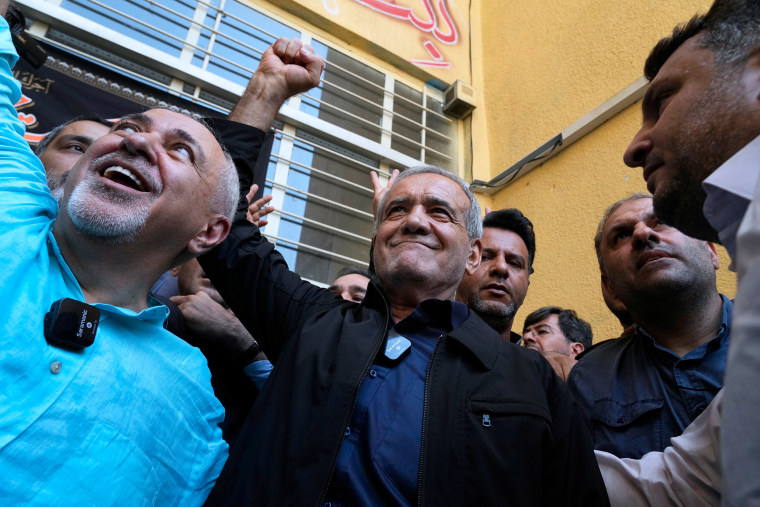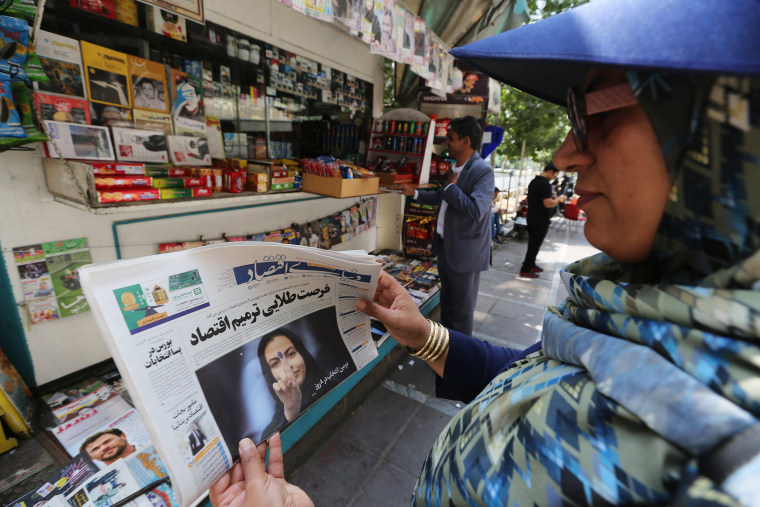Reformist candidate Masoud Pezeshkian has called for “cooperation, empathy and trust” after being declared the winner of Iran’s runoff presidential election Saturday. The win for reformists is a turn from the hard-line presidency of Ebrahim Raisi, who was killed in a helicopter crash in May.
Pezeshkian bested hard-liner Saeed Jalili by promising to reach out to the West and ease enforcement on the country’s mandatory headscarf law after years of sanctions and protests squeezing the Islamic Republic.
“Dear people of Iran, the election is over, and this is just the beginning of our working together. A difficult road is ahead. It can only be smooth with your cooperation, empathy and trust,” he posted on X.
Fawaz Gerges, professor of international relations at the London School of Economics, says the election represents a “moment of hope” for Iran’s reformists.
“Pezeshkian’s message of hope and change resonated with millions of Iranians who had previously showed political apathy by not casting their votes,” Gerges said. “This shows the thirst for social and political change in Iran.”
Pezeshkian promised no radical changes to Iran’s Shiite theocracy in his campaign and has long held Supreme Leader Ayatollah Ali Khamenei as the final arbiter of all matters of state in the country. But even Pezeshkian’s modest aims will be challenged by an Iranian government still largely controlled by hard-liners, the ongoing Israel-Hamas war in the Gaza Strip, and Western fears over Tehran enriching uranium to near-weapons-grade levels.
“His hands are fettered by the supreme leader and the national security council,” Gerges said. “Many Iranians who voted for Pezeshkian are clear-eyed about his ability to make a huge difference in their life, hoping he will make incremental changes.”
In a written message, Khamenei urged Pezeshkian to continue on the path set by his predecessor, Raisi, but thanked election organizers and celebrated a “free and transparent election.”
A vote count offered by authorities put Pezeshkian as the winner with 16.3 million votes to Jalili’s 13.5 million in Friday’s election. Overall, Iran’s Interior Ministry said 30 million people voted in an election held without internationally recognized monitors.

Supporters of Pezeshkian, a heart surgeon and longtime lawmaker, entered the streets of Tehran and other cities before dawn to celebrate as his lead grew over Jalili, a hard-line former nuclear negotiator.
Vladimir Putin, president of Russia, was among the first world leaders to congratulate Pezeshkian, calling for closer ties between the nations. India’s Prime Minister Narendra Modi and Chinese President Xi Xinping also called for stronger bilateral cooperation with Iran.
But Pezeshkian’s win still sees Iran at a delicate moment, with tensions high in the Mideast over the Israel-Hamas war in the Gaza Strip, Iran’s advancing nuclear program, and a looming U.S. election that could put any chance of a detente between Tehran and Washington at risk.
Pezeshkian’s victory also wasn’t a rout of Jalili, meaning he’ll have to carefully navigate Iran’s internal politics, as the doctor has never held a sensitive, high-level security post.
The first round of voting on June 28 saw the lowest turnout in the history of the Islamic Republic since the 1979 Islamic Revolution. Iranian officials have long pointed to turnout as a sign of support for the country’s Shiite theocracy, which has been under strain after years of sanctions crushing Iran’s economy, mass demonstrations and intense crackdowns on all dissent.
Government officials up to Khamenei predicted a higher participation rate as voting got underway, with state television airing images of modest lines at some polling centers across the country.

However, online videos purported to show some poll sites empty while a survey of several dozen sites in the capital, Tehran, saw light traffic amid a heavy security presence on the streets.
Authorities put the turnout in Friday’s election at 49.6%, historically low for an Iranian presidential election. They counted 607,575 voided votes in the contest — which are often a sign of protest by those who feel obligated to cast a ballot but reject both candidates.
The election came amid heightened regional tensions. In April, Iran launched its first-ever direct attack on Israel over the war in Gaza, while militia groups that Tehran arms in the region — such as the Lebanese Hezbollah and Yemen’s Houthi rebels — are engaged in the fighting and have escalated their attacks.
Iran is also enriching uranium at near-weapons-grade levels and maintains a stockpile large enough to build several nuclear weapons, should it choose to do so. And while Khamenei remains the final decision-maker on matters of state, whichever man ends up winning the presidency could bend the country’s foreign policy toward either confrontation or collaboration with the West.
The campaign also repeatedly touched on what would happen if former President Donald Trump, who unilaterally withdrew America from the Iran nuclear deal in 2018, won the November election. Iran has held indirect talks with President Joe Biden’s administration, though there’s been no clear movement back toward constraining Tehran’s nuclear program for the lifting of economic sanctions.
Though identifying with reformists and relative moderates within Iran’s theocracy during the campaign, Pezeshkian at the same time honored Iran’s paramilitary Revolutionary Guard, on one occasion wearing its uniform to Parliament. He repeatedly criticized the United States and praised the Guard for shooting down an American drone in 2019, saying it “delivered a strong punch in the mouth of the Americans and proved to them that our country will not surrender.”
The late Raisi was seen as a protégé of Khamenei’s and a potential successor as supreme leader.
Still, many knew him for his involvement in the mass executions that Iran conducted in 1988, and for his role in the bloody crackdowns on dissent that followed protests over the 2022 death of Mahsa Amini, a young woman detained by police over allegedly improperly wearing the mandatory headscarf, or hijab.